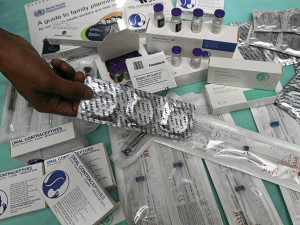MANILA — The Department of Health (DOH) is working on mechanisms, including the setting up of a call center, to improve its distribution of family planning items to the grassroots level.
“We are working on it. We are hoping that these commodities will be available all throughout the country and that women and couples who have chosen to use these family planning commodities would actually have access to them as well as to all services with regard to reproductive health,” said the DOH spokesperson, Dr. Eric Tayag.
“In the interim, a mechanism for the oversight for the implementation of RH law, we created or establish a call center that allows us to monitor the stocks, one that allows the DOH to receive requests or info about stock-outs so that replacements are made easier and faster,” Tayag shared.
“It’s being institutionalized, it’s housed at PopCom. …we want to make sure that in the future, our logistic supply is at par with the international standards and we’re working with our partners so we can find sustainable solutions,” he added.
Tayag said there have been several factors explaining why most of the family planning commodities have not reached the communities.
“We have faced difficult challenges including, of course, the recent Supreme Court issuance,” he said. “For one, we have stopped distribution of the implants because it was part of the SC temporary restraining order.”
The Supreme Court earlier denied the government’s request to lift the restraining order on the procurement, selling, distributing, dispensing, administering and promoting contraceptive implants.
“Secondly, the other distribution failures may be related to our couriers and so we are trying to fix that problem. Thirdly, this has something to do with the logistic chain supply management. Some of the LGUs (local government units) may have encountered stockout, and so this causes problems for mothers who should have access but did not get the family planning commodities,” Tayag said. SFM
